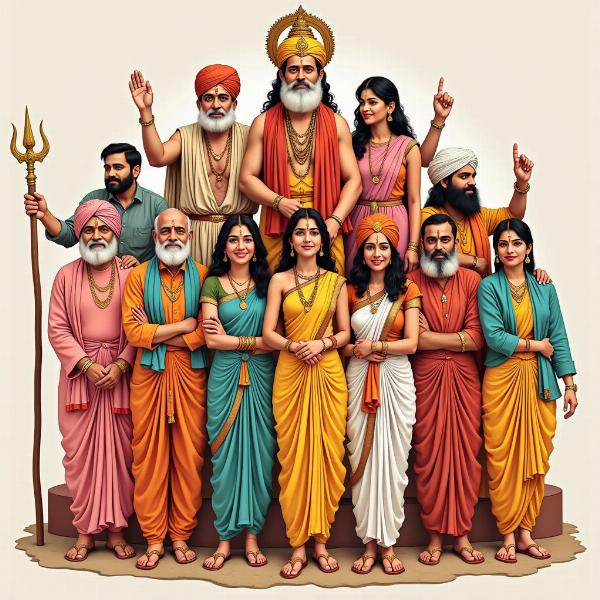Idolized meaning in Hindi encompasses a range of emotions from deep respect and admiration to outright worship. Understanding the nuances of these terms helps us grasp the cultural significance of idolization within the Indian context. This article will explore the various ways “idolized” is expressed in Hindi, delving into the cultural and religious practices associated with reverence and admiration.
From Respect to Worship: Exploring the Spectrum of “Idolized” in Hindi
The concept of “idolized” translates to several Hindi words, each carrying its own shade of meaning. While some terms denote simple respect, others signify a more profound reverence. Let’s explore these nuances:
- Poojaniya (पूजनीय): This term implies a high degree of respect and reverence, often used for elders, teachers, and religious figures. It suggests someone worthy of being honored and esteemed.
- Vandaniya (वंदनीय): Similar to “Poojaniya,” “Vandaniya” indicates someone deserving of respect and homage. It’s often used in formal settings to address respected individuals.
- Aradhya (आराध्य): This word takes the concept of respect a step further, signifying a deity or object of worship. It implies a deep devotion and adoration.
- Bhagwan (भगवान): This term is used to refer to God or a divine being, indicating the highest form of worship and reverence.
- Devi/Devta (देवी/देवता): These terms represent goddesses and gods, respectively, and are used to express devotion and worship within the Hindu pantheon.
 Idolized Figures in India
Idolized Figures in India
Cultural Significance of Idolization in India
Idolization is deeply ingrained in Indian culture, manifesting in various religious and social practices. From daily rituals to grand festivals, reverence and admiration are expressed through prayers, offerings, and acts of service. This deep-rooted respect for elders, teachers, and spiritual leaders reflects the importance of hierarchy and tradition within Indian society.
Religious Practices and Idolization
Hinduism, the dominant religion in India, is rich with examples of idolization. The vast pantheon of gods and goddesses, each representing different aspects of the divine, are worshipped through elaborate rituals and ceremonies. Devotees offer prayers, flowers, and food to express their devotion and seek blessings.
Idolizing Beyond the Divine: Respect for Elders and Mentors
The concept of idolization in India extends beyond religious figures to encompass elders, teachers, and mentors. These individuals are revered for their wisdom, experience, and guidance. Respect for elders is considered a fundamental value in Indian culture, often expressed through gestures like touching their feet as a mark of reverence.
What are some common ways to express “idolized” in everyday Hindi conversations?
“Poojaniya” and “Vandaniya” are commonly used in everyday conversations to address respected individuals. For instance, you might refer to your teacher as “Poojaniy Guruji” or a respected elder as “Vandaniya Mataji/Pitaji.”
How does the concept of “idolized” relate to the Guru-Shishya Parampara (teacher-student tradition) in India?
The Guru-Shishya Parampara emphasizes the importance of reverence and respect for the teacher. The Guru is seen as a guide and mentor, and students are expected to show utmost devotion and obedience.
Conclusion
Understanding the various nuances of “idolized” in Hindi provides valuable insights into the cultural fabric of India. From religious practices to social customs, reverence and admiration play a significant role in shaping interpersonal relationships and societal values. The rich vocabulary of Hindi offers a glimpse into the depth and complexity of idolization within the Indian context.
FAQ
- What is the most common Hindi word for “idolized”? While several words convey different aspects of idolization, “Poojaniya” and “Vandaniya” are commonly used to express respect and reverence in everyday conversations.
- How is idolization expressed in Hindu religious practices? Idolization in Hinduism is expressed through prayers, offerings, and elaborate rituals dedicated to various deities.
- Why are elders and teachers idolized in Indian culture? Elders and teachers are revered for their wisdom, experience, and guidance, reflecting the importance of hierarchy and tradition within Indian society.
- Is “Bhagwan” the only term used to refer to God in Hindi? While “Bhagwan” is a common term for God, other terms like “Ishwar” and “Parmatma” are also used.
- What is the significance of touching elders’ feet in Indian culture? Touching elders’ feet is a gesture of respect and humility, signifying reverence for their age and wisdom.
- How does “Aradhya” differ from “Bhagwan”? While both terms relate to worship, “Aradhya” can refer to a deity or object of worship, while “Bhagwan” typically refers to God.
- Are there any specific rituals associated with idolizing ancestors in India? Yes, Pitru Paksha is a period dedicated to honoring and remembering deceased ancestors through specific rituals and offerings.
Related Articles
Meaning-Hindi.in is your trusted partner for professional Hindi translation services. We specialize in various domains, including business and commercial documents, legal and certified translations, technical manuals, website localization, and educational materials. Our expert linguists ensure accurate and culturally sensitive translations, bridging the language gap for seamless communication. Contact us at [email protected] or +91 11-4502-7584 for all your Hindi translation needs. Meaning-Hindi.in is committed to providing high-quality language solutions for your global success.